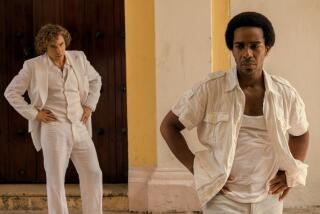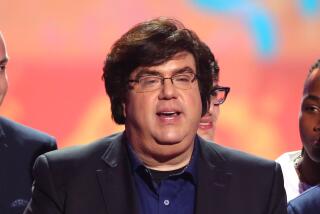Fighting the Giant : As scion of the wealthy tobacco clan, Patrick Reynolds could have had a life of ease. But when his family of smokers began to die, he had to take a stand.
- Share via
Patrick Reynolds, tobacco heir, easily explains himself: “I fight the tobacco industry. That is who I am, and what I do.”
At a Town Hall lecture last Thursday night, Reynolds, 45, proves he has few peers in his chosen role of biting the hand that used to feed him.
Casually, as if among friends, Reynolds straightens the jacket of his pearl gray suit, stands before 100 members of the prestigious current affairs group, and quietly starts to reminisce:
“My parents divorced when I was 3. I didn’t see my father again. At 9, I was so desperate for his hugs and love that I wrote him a letter: ‘Dear Dad, Where are you? I want to meet you. Your loving son, Patrick.’ ”
The letter reached R.J. Reynolds Jr. on a yacht in the South Seas. The father eventually sent for his son.
Patrick flew in one of his father’s private planes to an island estate off the coast of Georgia, where he was ushered into a darkened room. There, his father lay flat in bed, gasping for breath.
Richard Joshua Reynolds Jr., son and namesake of the founder of the great tobacco firm, was suffering from emphysema--the result of a life spent smoking the Camels and Winstons on which the family fortune was made.
Reynolds died slowly and painfully six years later, when Patrick was 15. In the interim, there were a few more visits, of increasingly shorter duration.
Since then, Patrick has lost four more close relatives from smoking-related causes. His half-brother R.J. Reynolds III--Joshua--whom Patrick called a “good buddy,” died June 28 in North Carolina of emphysema and heart failure. He was a heavy smoker of Winstons, Patrick told friends at a small memorial service he conducted in Santa Monica.
*
Reynolds has told his story repeatedly at universities, health groups, youth groups and corporate meetings around the country--lectures for which his average fee is $3,000.
Immediately after last Thursday’s talk, for example, he flew to address 10,000 teen-agers in Denver at an annual Seventh-Day Adventist gathering.
He’s a compelling speaker, partly because each time he talks the anguish is so apparent and sincere.
And partly because he is, after all, a Reynolds--scion of one of America’s great fortune-building clans. His patrician profile, blond good looks--the elegant, soft-voiced, delivery of a tale that could be straight out of “Dallas” or “Dynasty”--are the stuff to make audiences gaze in wonder at what this man’s gilded, turbulent life must be like.
That’s when Reynolds zaps them with reality. One out of every five deaths in the United States is due to smoking. It causes more deaths annually than cocaine, alcohol, heroin, fire, suicide, homicide, AIDS and auto accidents combined. It is the single most preventable cause of death, disease and addiction in our era, and tobacco is the only product sold legally in the world that has a harmful effect when used as intended. The direct medical cost for each pack of cigarettes smoked is about $2, he says.
His information is from the American Cancer Society, the American Lung Assn. and studies by various government and prestigious private institutions. The statistics he quotes are not even controversial, says Joseph Cherner of Smoke-Free Educational Services, a New York-based volunteer group. Yet our elected officials refuse to do much about stopping the plague, he says. Reynolds wants action. For starters, he’d like higher cigarette taxes, a ban on cigarette ads, and prohibition of the sale of cigarettes to people under 21.
“Sixty percent of all smokers start by age 14. Ninety percent are addicted by age 19,” he tells the group, citing figures from the U.S. Department of Health and Human Services. Why the apathy, he asks? It’s easy to blame only the tobacco industry, he says. But he believes that there are even more dastardly culprits.
They are the elected officials who accept hefty campaign contributions from the tobacco lobby--funds that give them a tremendous financial advantage over challengers at election time. Reynolds believes these officials won’t ever vote willingly against tobacco interests because they would lose the contributions the industry provides.
It’s as ugly and simple as that, Reynolds says. And he’s trying to gather citizens on his side to help stop it.
The tobacco industry is not amused. DeeDee Whitt, representative for R.J. Reynolds, says: “Adults don’t want to be told what to do, but Patrick wants to tell them anyway.” Thomas Lauria, spokesman for the Tobacco Institute, says the lobbying group “declines comment on Mr. Reynolds’ activities.”
Rep. Scotty Baesler (D-Ky.), who debated Reynolds on “Night-line” last week, says, “I represent the farmers out in the fields. Tobacco provides 60% of their income in our state. That can’t be changed or eliminated without great hardship--something Reynolds mightn’t understand.”
*
In 1979, Reynolds divested himself of $2.5 million worth of tobacco stock inherited from his grandmother. His mother, a lifetime smoker, had recently died of emphysema and heart disease; his favorite aunt, Nancy, of lung cancer and emphysema.
He was fighting his own pack-a-day habit of 10 years, which he finally conquered in 1986. One year later, he notified his brothers that he was about to testify on Capitol Hill in favor of a ban on cigarette ads.
“You’re gonna do what, boy?” asked his half-brother Will, worried that the publicity would make Reynolds stock drop in value. Half-brother John, when told the news, worried that their father and grandfather would “spin in their graves.”
And brother Michael told the press that although he didn’t agree with his brother, “Patrick is sincere.” Patrick says that until his half-brother Joshua died in June, they maintained a good relationship by “agreeing to disagree” about tobacco.
Reynolds’ first anti-smoking testimony in Washington catapulted him to a kind of national fame that has been more enduring than his sporadic attempts at an acting career, which he never pursued with as much vigor.
He has appeared on virtually all the major network and cable TV news and talk shows, from “Good Morning America” to “Oprah,” “Larry King Live” and “Nightline.” His dossier includes raves from media hosts, who frequently invite him back for more. And his numerous humanitarian awards come from the World Health Organization, hospitals, schools and civic groups.
In 1989, he started a nonprofit, charitable organization, “Citizens for a Smoke-Free America,” which he runs from his combined home and office on the eastern fringe of Beverly Hills.
“Our mission is to educate,” he tells the Town Hall gathering, and to eventually “create a society that is totally smoke-free.”
But the shocker of the evening comes after Reynolds’ talk, during a lively period of questions.
“Could you tell us how your organization works,” asks a woman who wants to know how many employees he has, what they do, how they go about trying to rid the world of tobacco.
Reynolds pauses. Smiles. Rubs his forehead. Then divulges that he “has no money” for employees, that he can afford a secretary only on Friday afternoons, that he works alone out of his small house--and that he is in need of funds to continue his crusade. “I earn my living from giving these lectures,” he says.
Reynolds is not exactly poor by most people’s standards, but he might have been much richer if he’d kept his stock. He says he has spent about half his inheritance on the anti-smoking crusade, and he lives off the interest on the remainder along with earnings from his lectures and various other projects.
He never inherited a cent from his father, who left an estate valued “anywhere from the tens of millions to the hundreds of millions,” Reynolds says.
His father, a pioneer in the airline and shipping industries and a onetime treasurer of the National Democratic Party, married four times.
The first marriage produced four sons and lasted until he set eyes on Patrick’s mother, Marianne O’Brien--a Warner Bros. starlet described by Patrick as “an extraordinary beauty.”
R.J. Reynolds Jr. left his first wife and sons for O’Brien, after a divorce settlement that was the largest in U.S. history at that time.
Patrick was one of two sons born during their seven-year marriage, after which his father married a third time--a union that produced no offspring. R.J. Reynolds Jr.’s fourth wife bore him a daughter 36 hours after he died in 1964.
The daughter of that union, Irene Reynolds, lives “somewhere in Europe,” Patrick says.
Patrick’s father did pay for his young son’s summers at sailing camp in North Carolina. And for elite boarding schools from the age of 9, and for Hotchkiss preparatory school in Connecticut, after which Patrick entered the University of California, Berkeley.
He was raised like a prince but had no realm. A few, uncommunicative visits with his dad, from the ages of 9 to 15. And one weekend a month with his mother, when he came home from boarding school. “There was no mirror for me to look into, to ever know who I really was,” Reynolds says.
He has undergone psychotherapy, attended Adult Children of Alcoholics for two years and participates in a men’s group where he can unload the accumulated grief. “Once you grieve, you can heal,” he says.
He readily admits to scads of broken romances and a two-year marriage that ended in divorce. He wants nothing more than to marry someone “from a nice family” with whom he can have children, he says. He would like to be the father he never had.
Meanwhile, he says, he’ll continue to battle against the industry that gave him so much--and then took it away.
More to Read
Sign up for Essential California
The most important California stories and recommendations in your inbox every morning.
You may occasionally receive promotional content from the Los Angeles Times.













